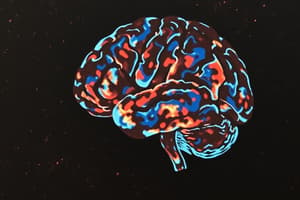Podcast
Questions and Answers
What is the primary function of sustained attention?
What is the primary function of sustained attention?
- To process multiple sources of information simultaneously
- To maintain focus over a long period (correct)
- To switch between different tasks or stimuli
- To focus on specific stimuli or tasks
According to the Atkinson-Shiffrin model, what is the first stage of information processing?
According to the Atkinson-Shiffrin model, what is the first stage of information processing?
- Long-term memory
- Short-term memory
- Sensory memory (correct)
- Retrieval
What is the primary difference between selective attention and divided attention?
What is the primary difference between selective attention and divided attention?
- The level of processing required
- The type of stimuli being attended to
- The ability to focus on multiple stimuli simultaneously (correct)
- The duration of attention
What is the primary function of sensation in perception?
What is the primary function of sensation in perception?
What is the primary limitation of the bottleneck model of attention?
What is the primary limitation of the bottleneck model of attention?
What is the primary difference between encoding and retrieval in memory?
What is the primary difference between encoding and retrieval in memory?
What type of processing is influenced by prior knowledge and expectations in perception?
What type of processing is influenced by prior knowledge and expectations in perception?
Which learning theory focuses on observable behavior?
Which learning theory focuses on observable behavior?
What is the process of generating speech in language production?
What is the process of generating speech in language production?
Which type of conditioning associates stimuli with responses?
Which type of conditioning associates stimuli with responses?
What is the process of interpreting sensory information?
What is the process of interpreting sensory information?
Which type of language processing is influenced by environment and interaction?
Which type of language processing is influenced by environment and interaction?
Flashcards are hidden until you start studying
Study Notes
Attention
- Definition: The selective focus on certain stimuli or tasks while ignoring others.
- Types of attention:
- Sustained attention: Maintaining focus over a long period.
- Selective attention: Focusing on specific stimuli or tasks.
- Alternating attention: Switching between different tasks or stimuli.
- Divided attention: Processing multiple sources of information simultaneously.
- Theories of attention:
- Filter model: Information is filtered out based on relevance.
- Bottleneck model: Information is processed in a serial manner.
- Capacity model: Attention is limited by processing capacity.
Memory
- Types of memory:
- Sensory memory: Brief storage of sensory information.
- Short-term memory: Limited capacity, information is lost unless rehearsed.
- Long-term memory: Permanent storage of information.
- Memory processes:
- Encoding: Information is processed and stored.
- Storage: Information is retained.
- Retrieval: Information is accessed from storage.
- Memory models:
- Atkinson-Shiffrin model: Information flows from sensory memory to short-term memory to long-term memory.
- Levels of processing model: Information is processed at different levels (shallow or deep).
Perception
- Definition: The process of interpreting and understanding sensory information.
- Perceptual processes:
- Sensation: The detection of sensory stimuli.
- Perception: The interpretation of sensory information.
- Theories of perception:
- Bottom-up processing: Perception is driven by sensory information.
- Top-down processing: Perception is influenced by prior knowledge and expectations.
- Perceptual biases:
- Contextual influence: Perception is influenced by surrounding context.
- Expectation: Perception is influenced by prior expectations.
Learning
- Types of learning:
- Classical conditioning: Associating stimuli with responses.
- Operant conditioning: Learning through consequences of behavior.
- Social learning: Learning through observation and imitation.
- Learning theories:
- Behavioral learning theory: Focus on observable behavior.
- Cognitive learning theory: Focus on mental processes and representations.
- Factors influencing learning:
- Motivation: Desire to learn.
- Reinforcement: Consequences of behavior.
Language Processing
- Language comprehension:
- Phonology: Processing of speech sounds.
- Syntax: Processing of sentence structure.
- Semantics: Processing of meaning.
- Language production:
- Speech planning: Generating speech.
- Speech execution: Articulating speech.
- Theories of language processing:
- Serial processing: Language is processed in a sequential manner.
- Parallel processing: Language is processed simultaneously.
- Language development:
- Language acquisition device: Innate ability to learn language.
- Interactionist approach: Language development is influenced by environment and interaction.
Studying That Suits You
Use AI to generate personalized quizzes and flashcards to suit your learning preferences.



